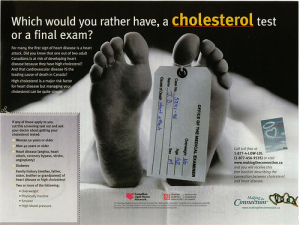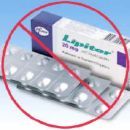================================================================
__________________________________________
A Woman on Crestor With Leg Muscle Pain
Sally, a 56 year old retired real estate agent, came to see me in the office with the chief complaint of hot flashes, night sweats, mood disturbance and weight gain which are all fairly typical post-menopausal symptoms. In addition, she also had leg pain for the past 3 months, which prevented exercising. Lumbar Spine MRI Scan to evaluate the leg pain showed only a bulging disk and was otherwise negative. About 6 months ago, Sally’s cholesterol was 245, and her cardiologist prescribed a cholesterol lowering statin drug, Crestor. Sally has no history of heart disease, does not smoke, eats a healthy diet, and takes a few vitamins, and doesn’t supplement with CoEnzyme Q-10.

MRI Scan of Leg Muscles
I explained to Sally that her leg pain was a well known adverse side effect of Crestor, a valid reason for stopping the drug. The leg muscle pain is caused by Statin Drug depletion of Co-Enzyme Q 10, which is important for energy production in the muscle cells. I suggested to Sally that she supplement with CO-enzyme Q-10, and strongly recommended stopping the statin drug.

When I was a medical student in 1976, normal cholesterol was 240. However, this was changed in 1993 to the new guidelines.
New Cholesterol Guidelines in 1993
above 240: high
above 200: borderline high
below 200: desirable
The cholesterol guidelines were revised downward to 200 by a committee of nine doctors, eight of whom were receiving money from statin drug companies, a blatant conflict of interests. In addition, there was no science behind this revision. (1 ) (2) (3)
A 2006 paper in the Annals of Internal Medicine (October 3, 2006; 145(7): 520-530) argues that there is NO EVIDENCE to support the target numbers outlined by the Cholesterol Guidelines panel, challenging the mainstream medical belief that lower cholesterol levels are always better. “This paper is not arguing that there is strong evidence against the LDL targets, but rather that there’s no evidence for them,” said Dr. Rodney A. Hayward, a study author. A 2004 petition letter to the NIH by 30 prominent MD's complains about the faulty Cholesterol Guidelines and asks for a revision.
The laboratory will flag any cholesterol test results above 200 as abnormal. Please ignore this. In reality a cholesterol reading above 200 and below 240 is normal. If above 240, then nutritional supplements containing niacin, omega 3 oils, and plant sterols are used to bring it down to 240. (4)
Mary Enig says: "Blood cholesterol levels between 200 and 240 mg/dl are normal. These levels have always been normal. In older women, serum cholesterol levels greatly above these numbers are also quite normal, and in fact they have been shown to be associated with longevity. Since 1984, however, in the United States and other parts of the western world, these normal numbers have been treated as if they were an indication of a disease in progress or a potential for disease in the future. (4)
A cholesterol of 240 is NOT ELEVATED. This is normal and compatible with good health.
Medical Terrorism through Drug Company Advertising:

The reality is that there is no mortality benefit from lowering cholersterol with statin drugs: Both lines on the mortality chart below are superimposed meaning the number of deaths in the statin drug group was identical to the number of deaths in the placebo group. Chart Courtesy of (Eddie Vos).

Analyzing data from five statin drug studies (4S, WOSCOPS, CARE, TEXCAPS/AFCAPS and LIPID), Peter R Jackson found a 1% increase in mortality after 10 years on statin drugs in people with no pre-existing heart disease (primary prevention)(38).
Just say NO When Your Doctor Prescribes a Statin Drug.

The truth is that NO woman should ever be given Lipitor or any other statin drug for elevated cholesterol. Dr. Rose says, "There are no statin trials with even the slightest hint of a mortality benefit in women and women should be told so". (5). In other words, statin drugs don’t work for women.
No Female Should Ever Take A Statin Drug
Let me repeat that so this is very clear: No female should ever take a statin drug to lower cholesterol for primary prevention of heart disease. They don’t work for women. Women who take Lipitor or any other statin drug to lower cholesterol do not live any longer than women who don’t take the drug. There is no benefit in terms of prolonging your life for women. Adverse Side Effects of Statin Drugs:
On the other hand, there are plenty of adverse side effects which include muscle pain, cognitive impairment, neuropathy, congestive heart failure, transient global amnesia, dementia, cancer and erectile dysfunction (impotence).Read about Statin Drug adverse side effects on this message board and this message board. The side effects are thought to be caused by Co-Enzyme Q10 depletion.
 Why do Cardiologists Give Statin Drugs to Women?
Why do Cardiologists Give Statin Drugs to Women? Why do cardiologists and mainstream docs continue to prescribe statins to women? It is very simple, they succumb to the drug company “spin” from the drug reps and the medical journals which are slanted in favor of statins. In addition, the mainstream doctors succumb to patient's demands and expectations for the drugs after seeing the celebrity TV ads.
Are You Still Not Convinced?
Mary Enig writes, "No study has shown a significant reduction in mortality in women treated with statins. The University of British Columbia Therapeutics Initiative came to the same conclusion, with the finding that statins offer no benefit to women for prevention of heart disease." (6) (7)
Are you still not convinced that women should NOT take Statin Drugs? Don’t take my word for it. Take the word of Judith Walsh MD who wrote this in JAMA, 4 years ago in an article entitled, Treatment of Hyperlipidemia in Women: "For women without cardiovascular disease, lipid lowering does not affect total or CHD (Cardiovascular Heart Disease) mortality. Lipid lowering may reduce CHD events, but current evidence is insufficient to determine this conclusively. For women with known cardiovascular disease, treatment of hyperlipidemia is effective in reducing CHD events, CHD mortality, nonfatal myocardial infarction, and revascularization, but it does not affect total mortality."(8)
Translation: Cholesterol lowering with statin drugs does not reduce total mortality in women, PERIOD. It doesn’t reduce mortality in women without heart disease, called primary prevention. It doesn’t reduce mortality in women with heart disease, called secondary prevention.
Still not convinced? then read this article by Malcolm McKendrick, a doctor in England, in the British Medical Journal, May 2007, entitled: "Should Women be Offered Cholesterol Lowering Drugs? NO ".(8A) "To date, none of the large trials of secondary prevention with statins has shown a reduction in overall mortality in women. Perhaps more critically, the primary prevention trials have shown neither an overall mortality benefit, nor even a reduction in cardiovascular end points in women. This raises the important question whether women should be prescribed statins at all. I believe that the answer is clearly no."(8A)
Note: Secondary prevention means women with known heart disease. Primary prevention means women without known heart disease.
Still not convinced ? Then read this June 2007 article by Electra Kaczorowski, of the National Women’s Health Network "There is currently no indication that women of any age or any risk level will benefit from taking statins to prevent CHD and other heart conditions – yet this is precisely how statins are being marketed to women. " (9)
Still not convinced ? Are statin drugs good for anybody? Read this review article by Joel Kauffman PhD, Dec 2003, in which the best statin trial results (the HPS simvastatin study) had an absolute reduction of all cause death rate of 0.38% per year. Yet this performance was inferior to the less expensive alternatives of buffered aspirin or Omega-3 oils.(10)
Quote: "The most favorable (statin) trial with seemingly impeccable reporting and minimal financial conflict of interest was the Heart Protection Study (HPS), on simvastatin for 5 years, in which secondary prevention in men (86% of patients) of any unwanted vascular event gave a RR = 0.76 (5.5% absolute, 1.1% per year), and an all-cause death rate drop of 0.38% per year. (Lancet 2002; 360:7-22) Since this performance is inferior to that of either Bufferin in men or omega-3 fatty acid supplements, both of which have lesser side-effects, and are far less expensive, the logic of prescribing simvastatin seems faulty."(10)
Still not convinced ? Then read this article by Harriett Rosenberg from Women and Health Protection from June 2007, Do Cholesteriol Lowering Drugs Benefit Women ? (11) Evidence for Caution: Women and statin use By Harriet Rosenberg Danielle Allard Women and Health Protection June 2007
Quote: "Our review of these fields identifies a troubling disjuncture between the widespread use of statin medication for women and the evidence base for that usage. What we found instead was evidence for caution."
Still not convinced ? Not only are statin drugs a failure for women, they also should never be prescribed to the elderly. Mortality in the elderly goes up as cholesterol goes down. Read this Letter to the Editor by Eddie Vos. (12)
Quote:"Regarding women, two 2004 analysis found no reduction in deaths from statin over placebo. In actual patient outcomes, the J-LIT study in 41,801 hypercholesterolemic Japanese (2/3rds women) found mortality in the 2 lowest on-statin cholesterol categories 2-3 times higher; its authors cautioned about ‘hyperresponders’ to statin. The 4S study ended with 3 more dead women on statin vs. placebo, and another ‘successful’ study, HPS, found no significant mortality benefit in women." See article for references.
Still not convinced ? Then read this article by Bill Sardi, Who Will Tell the People? It Isn't Cholesterol ! (13) " If physicians were truly honest with their patients, there probably would be very few people being treated for primary prevention with a statin drug."
Still not convinced? Then read this Jan 2007 Lancet article by Harvard trained MD, John Abramson, "Are lipid-lowering guidelines Evidence-Based ? ". (14)
Quote:" No studies have shown statin cholesterol-lowering drugs to be effective for women at any age, nor for men 69 years of age or older, who do not already have heart disease or diabetes. Better than 50 adults have to take a cholesterol-lowering drug for 1 patient to avoid a mortal heart attack, and that figure only applies to high-risk patients. There is a vanishing benefit to lowering cholesterol for healthy adults." [Lancet 2007; 369:168-169].
Dr. John Abramson joins with 30 more eminent MD's in this Sept 2004 letter to the NIH calling for a complete revision of the faulty cholesterol treatment guidelines.
Still not convinced? Then read this e-book by Shane Ellsion, "The Hidden Truth About Cholesterol-Lowering Drugs! ", by Shane Ellison, MS, Organic Chemistry. (15)
"Among healthy people, statin drugs do not prevent early death from heart disease, despite their cholesterol lowering effects. This is because there is no correlation or
relationship between low cholesterol and the progression of atherosclerosis – the number one cause of heart disease. Repeat that sentence. This became abundantly
clear with the statin drug trials."


The New York Times Questions the Value of Lowering Cholesterol with Statin Drugs !!
In a surprise turnaround, The New York Times questions the value of treating cholesterol with statin drugs in this article, "New Questions on Treating Cholesterol", By ALEX BERENSON, New York Times January 17, 2008 . (16)
"In the last 13 months, however, the failures of two important clinical trials have thrown that hypothesis into question. (that cholesterol lowering is beneficial).
First, Pfizer stopped development of its experimental cholesterol drug torcetrapib in December 2006, when a trial involving 15,000 patients showed that the medicine caused heart attacks and strokes. That trial — somewhat unusual in that it was conducted before Pfizer sought F.D.A. approval — also showed that torcetrapib lowered LDL cholesterol while raising HDL, or good cholesterol.
Torcetrapib’s failure, Dr. Taylor said, shows that lowering cholesterol alone does not prove a drug will benefit patients.
Then, on Monday, Merck and Schering-Plough announced that Vytorin, which combines Zetia with Zocor, had failed to reduce the growth of fatty arterial plaque in a trial of 720 patients. In fact, patients taking Vytorin actually had more plaque growth than those who took Zocor alone.
Despite those drawbacks, that trial, called Enhance, also showed that patients on Vytorin had lower LDL levels than those on Zocor alone. For the second time in just over a year, a clinical trial found that LDL reduction did not translate into measurable medical benefits." endquote from Alex Berenson New York Times (16)


Business Week Questions the Benefit of Lowering Cholesterol with Statin Drugs !! ( Business Week Questions the Benefit of Lowering Cholesterol with Statin Drugs !! ( Business Week Questions the Benefit of Lowering Cholesterol with Statin Drugs !! (17)
In an historic turnaround, Business Week’s Jan 28, 2008 cover story asks the heretical question, "Do Cholesterol Drugs Do Any Good? Research suggests that, except among high-risk heart patients, the benefits of statins such as Lipitor are overstated."
Astonishingly, Business Week makes the following statements:
"Current evidence supports ignoring LDL cholesterol altogether "
"Cholesterol lowering is not the reason for the benefit of statins". (17)
 Investigation !!
Investigation !! by
John Dingell's House Committee and
New York Attorney General Andrew Cuomo
1) Senator John Dingell’s House Committee of Energy and Commerce has recently subpoenaed both Merck and Pfizer. Merck's subpoena investigates the Vytorin - Enhance scandal and Pfizer's subpoena investigates the Jarvik-Lipitor Celebrity Ads. Dingell wants to know why Jarvik was selected as spokeman for Lipitor even though Jarvik was never licensed to practiced medicine.


John D. Dingell has a few questions,
Democratic Representative from Michigan and Chairman of the House Committee on Energy and Commerce
Click Here for Dingell's Letter to Merck on Vytorin Scandal Click Here for Dingell's Letter to Pfizer Investigating Jarvk-Lipitor Ads
2) The Attorney General has a few questions: The Enhance Vytorin scandal has prompted New York Attorney General Andrew Cuomo to issue a subpeana to Merck & Co and Schering-Plough Corp to investigate the allegations of deceitful marketing and insider trading.
The Vytorin Enhance Data showed no benefit for the Zetia/Zocor combination compared to Zocor alone. This created a scandal because of the late registration of the Enhance study, and accusations of insider trading, dumping stock in advance of the unfavorable results. Merck and Schering sat on the results of an unfavorable study for almost two years. They claim they haven’t peeked at the data, but Schering President Carrie Cox dumped 28 Million worth of stock back in the spring of 2007.
3) Two recent drug trials, ENHANCE and Torcetrapib showed no health benefit of lowering LDL cholesterol. Dr Steven Nissen, cardiologist at Cleveland Clinic, said this of the Merck Enhance-Vytorin data:
”ENHANCE (Vytorin) results were a big surprise and a big disappointment. The data show no benefit for ezetimibe (Zetia) on top of simvastatin (Zocor). In fact, the data on both the rate of progression of atherosclerosis and cardiovascular events are trending in the wrong direction. This is a pretty clear failure. Physicians should now stop using ezetimibe or Vytorin except as a last resort. The drug doesn’t work”.
The results of the ENHANCE had to be released because now all trials must be pre-registered with the government because of new FDA rules Sept 2007. In the old days it would have been buried. (22B)
The following quote about Vytorin-Enhance from Bill Sardi at LewRockwell.com is illuminating (18 )
"The revelation that statin cholesterol drugs may be of little or no benefit, as revealed in a lengthy cover story in January 28 issue of Business Week (BW) magazine, begs the question: how did this misdirection go on for so long?
As the BW article pointed out, statin drugs "are the best-selling medicines in history, used by more than 13 million Americans and an additional 12 million patients around the world, producing $27.8 billion in sales in 2006."
How can anyone question the benefits of such a drug, asks BW, when they are "thought to be so essential that, according to the official government guidelines from the National Cholesterol Education Program (NCEP), 40 million Americans should be taking them. Some researchers have even suggested – half-jokingly – that the medications should be put in the water supply, like fluoride for teeth. And it's almost impossible to avoid reminders from the industry that the drugs are vital. A current TV and newspaper campaign for one statin drug, as endorsed by Dr. Robert Jarvik, artificial heart inventor, proclaims that this drug ‘reduces the risk of heart attack by 36%...in patients with multiple risk factors for heart disease’."
Statin drug ruse revealed:
But the cholesterol/statin drug ruse finally unraveled when, after two years of foot dragging delays to release data from a large study involving Zetia, a cholesterol-lowering drug that inhibits cholesterol absorption from foods, and Vytorin, which is a combination of Zetia plus Zocor, the latter a statin drug that inhibits formation of cholesterol in the liver, revealed no health benefits.
Even though this drug combo lowered circulating cholesterol numbers better than either drug alone, it did not reduce plaque formation in arteries and did not confer a projected reduction in mortality.
In fact, an earlier review published last year in the British journal Lancet by Drs. John Abramson of Harvard Medical School and James M. Wright MD of the University of British Columbia, could find no evidence for a reduction in cardiac mortality in a combined review of all published statin drug studies. [The Lancet 2007; 369:168–169] Falsifying the numbers:
The Business Week report says statin drugs benefit only 1 in 100 users, but they claim to reduce the risk of a non-mortal heart attack by 36%. But that figure is a relative number, not a hard one. About 3% of patients taking an inactive placebo pill will experience a heart attack compared to 2% taking a statin drug, which produces the so-called 30-plus percent risk reduction. But in hard numbers, this is only a 1% reduced risk. This type of misleading advertising wouldn’t pass Federal Trade Commission guidelines. But public health agencies, serving as free publicity agents for the statin drug manufacturers, repeat the claim to give it a ring of credibility." end quote from Bill Sardi on Lew Rockwell.com.


America Fooled Again
More on the Merck Vytorin/Enhance Scandal:
(19) (20)
Merck ran these these Cholesterol Lowering-Vytorin Televison Ads (see below) over the course of about a year spending 160 million dollars, allowing a windfall of 1-2 billion dollars on the sale of Vytorin. All the time they knew that the ENHANCE study showed that Vytorin didn't work. Take at look at the TV ads that fooled a nation into spending a fortune for drugs that don't work.
Click Here for: Vytorin Ad Video (21)
Click Here For: Another Vytorin Ad Video
Click Here For: Vytorin Ad video Parody by Mike Adams of NewsTarget
The Vytorin Ads have been pulled, so you won't be seeing them on national TV anymore.
Click here for a Wall Street Journal story, "Congress Investigates Vytorin Ads", by Anna Wilde Mathews: (22A)
Click Here for "Vytorin Ad Shame Taints Entire Marketing Industry Cholesterol Drug's Ad Campaign Turns Into PR Nightmare, Fanning Flames of Public Mistrust of DTC" by Rich Thomaselli Published: January 21, 2008 (22C).

Lipitor and the Dracula of Medical Technology
In a previous newsletter Lipitor and the Dracula of Medical Technology, I discussed the Robert Jarvik celebrity ads for Lipitor. One year later after this first newsletter, John Dingell’s House Committee on Energy and Commerce is now investigating the matter. They have issued Subpoenas to Pfizer CEO, Jeffrey B Kindler, asking for information about the Jarvik-Lipitor Ad Materials. (22)
Among other things, Chairman John Dingell wants to know why Jarvik takes Lipitor, and why Jarvik appears to be representing a doctor in the Ads, yet has never actually been licensed to practice medicine. Jarvik never actually prescribed Lipitor or any other drug for that matter. In response, Pfizer pulled the Jarvik Lipitor ads (2/25/08) from Television and will not be shown any more. (40)


Robert Jarvik, MD, Inventor of the Jarvik Heart
and Spokesman for Lipitor, along side a popular movie hero
The New York Times dubbed the Jarvik Heart, "the Dracula of Medical Technology". After 90 Jarvik Hearts were implanted, the Jarvik Artificial Heart was banned. All Jarvik Heart recipients died a slow agonizing death within 6 months from multi-organ failure and sepsis, and all recipients were given the Kevorkian option of assisted suicide with a key to turn off the machine, ending their lives.

Click Here for a Wall Street Journal Article about Dingell's Investigation asking why Jarvik was chosen to sell Lipitor (23). Click Here to see Robert Jarvik appearing in a Lipitor Television Video selling Lipitor to the masses (60 seconds).(24)
Can you imagine what Jarvik would think about Lipitor if Jarvik had an enlightening conversation with John Abramson, M.D., or actually looked at the J-Lit data shown in the chart below which shows that mortality is the highest at the lowest cholesterol and LDL levels, a result just the opposite to what one would expect if cholesterol lowering was beneficial to one's health. Notice the lowest mortality (lowest red bar) is located at 240-250 total cholesterol, and as cholesterol is lowered below 230, mortality goes up. The LDL chart below shows the same findings.

J-Lit Mortality Data Chart courtesty Eddie Vos, from Circ J 2002;66:1087–1095, Mortality is highest at lowest cholesterol vales.
If Jarvik knew what this chart showed, would he then call a press conference recanting his position, apologizing to the nation for his part in the misleading and deceitful Lipitor Drug Ad campaign? Would Jarvik then tell the truth, and caution all women and elderly to avoid statin drugs ? If Doctor Jarvik has an ounce of moral fibre that is exactly what he should and must do. We are waiting.

Could this be the END of the Statin Drug Era? I Hope So
Feb 25 2008 latest development: Pfizer pulls the Jarvik Lipitor Ads. (40)How to Prevent and Reverse Heart Disease without Statins Click Here to read my article: Reversing Heart Disease Without Drugs
Click Here to read about Hypothyroidism and Heart Disease
In 1970, Dr. Broda Barnes had 1,569 patients on natural thyroid hormone who were observed for a total of 8,824 patient years. These patients were compared to similar patients in the Framingham Study. Based on the statistics derived in the Framingham Study, seventy-two of Dr. Barnes’s patients should have died from heart attacks; however, only four patients had done so. This represents a decreased heart attack death rate of 95 percent in patients who received natural thyroid hormone–a truly remarkable finding.
A List of All the Statin Drugs with Chemical Name and Trade Name:
Atorvastatin = Lipitor, Torvast
Cerivastatin = Lipobay, Baycol.
Fluvastatin = Lescol, Lescol XL
Lovastatin = Mevacor, Altocor
Mevastatin
Pitavastatin = Livalo, Pitava
Pravastatin = Pravachol, Selektine
Rosuvastatin = Crestor
Simvastatin = Zocor, Lipex
Simvastatin+Ezetimibe = Vytorin
Lovastatin+Niacin extended-release = Advicor
Atorvastatin+Amlodipine Besylate = Caduet
How Do Statin Drugs Work?
Statin Drugs lower cholesterol by inhibiting the enzyme HMG-CoA reductase, which is the rate-limiting enzyme of the mevalonate pathway of cholesterol synthesis. Inhibition of HMG-CoA reductase also blocks production of Co-Enzyme Q10.How were Statin Drugs Invented?
Statins are isolated poisons derived from the fungus known as red yeast rice (Monascus purpurus).
Did you find this newsletter interesting? Feel free to Email it to a friend, or sign up for the newsletter with the link on the left sidebar. Can't convince your doctor NOT TO prescribe statin drugs for you?
Print this newsletter and give it to your doctor.Jeffrey Dach MD
4700 Sheridan Suite T
Hollywood FL 33021
954 983-1443 www.jeffreydach.com
www.drdach.com
www.naturalmedicine101.com
www.truemedmd.com
References
The new cholesterol guidelines, Applying them in clinical practice Brian L. Pearlman, MD, FACP VOL 112 / NO 2 / AUGUST 2002 / POSTGRADUATE MEDICINE
(2) http://hp2010.nhlbihin.net/ncep_slds/atpiii/slide25.htm
The new cholesterol guidelines
(3) http://www.usatoday.com/news/health/2004-10-16-panel-conflict-of-interest_x.htm
USA Today, 2004, Cholesterol guidelines become a morality play the Associated Press
(4) http://www.westonaprice.org/knowyourfats/fats_phony.html
Mary Enig, Cholesterol and Heart Disease-- A Phony Issue
(5) http://www.cmaj.ca/cgi/content/full/173/10/1207-a
Questioning the benefits of statins Eddie Vos and Colin P. Rose , CMAJ • November 8, 2005; 173 (10). doi:10.1503/cmaj.1050120.
(6) http://www.westonaprice.org/moderndiseases/statin.html
Dangers of Statin Drugs: What You Haven’t Been Told About Popular Cholesterol-Lowering Medicines By Sally Fallon and Mary G. Enig, PhD
(7) http://www.ti.ubc.ca/pages/letter48.htm
Therapeutics Initiative, Do Statins have a Role in Primary Prevention? There were 10,990 women in the primary prevention trials (28% of the total). Only coronary events were reported for women, but when these were pooled they were not reduced by statin therapy, RR 0.98 [0.85-1.12]. Thus the coronary benefit in primary prevention trials appears to be limited to men, RR 0.74 [0.68-0.81], ARR 2.0%, NNT 50 for 3 to 5 years.
(8) http://jama.ama-assn.org/cgi/content/abstract/291/18/2243
Drug Treatment of Hyperlipidemia in Women Judith M. E. Walsh, MD, MPH; Michael Pignone, MD, MPH JAMA. 2004;291:2243-2252.
(8A) http://www.bmj.com/cgi/content/full/334/7601/983
BMJ 2007;334:983 (12 May), doi:10.1136/bmj.39202.397488.AD Should women be offered cholesterol lowering drugs to prevent cardiovascular disease? No Malcolm Kendrick, general practitioner
(9) http://www.nwhn.org/newsletter/article.cfm?content_id=134
Women's Health Activist May/ June 2007: Exploring Statins: What Does the Evidence Say? By Electra Kaczorowski, National Women’s Health Network
(10) http://www.recoverymedicine.com/cholesterol_lowering_drug_side_effects.htm
Statin Drugs: A Critical Review of the Risk/Benefit Clinical Research, Joel M. Kauffman, Ph.D. Professor of Chemistry Emeritus USP Philadelphia, PA, USA 9 Dec 2003
(11) http://www.whp-apsf.ca/pdf/statinsEvidenceCaution.pdf
Evidence for Caution: Women and statin use By Harriet Rosenberg Danielle Allard Women and Health Protection June 2007
(12) http://www.health-heart.org/malpractice.pdf
LETTER TO THE EDITOR: Statins for women, elderly: Malpractice? Nutrition, Metabolism & Cardiovascular Diseases (2007) 17, e19ee20 Eddie Vos 127 Courser Rd, Sutton (Qc),
(13) http://www.lewrockwell.com/sardi/sardi69.html
Who Will Tell the People? It Isn't Cholesterol! by Bill Sardi
(14) http://overdosedamerica.com/articles.php
Lancet: Vol 369 January 20, 2007 Are lipid-lowering guidelines evidence-based? J Abramson and JM Wright
(15) http://www.health-fx.net/eBook.pdf
The Hidden Truth About Cholesterol-Lowering Drugs, by Shane Ellison, MS, Organic Chemistry
(16) http://www.nytimes.com/2008/01/17/business/17drug.html
New Questions on Treating Cholesterol, By ALEX BERENSON, New York Times January 17, 2008
(18) http://www.lewrockwell.com/sardi/sardi79.html
Government Health Agencies Complicit in Cholesterol Ruse by Bill Sardi on Lew Rockwell.com
(19) http://pharmamkting.blogspot.com/2008/01/should-i-stop-taking-zetia.html
Pharma Marketing Blog by Shaun McIver, of Streamlogics, Inc discussion of Zetia Enhance trial.
(20) http://blogs.wsj.com/health/2008/01/14/zetia-doesnt-enhance-zocor/
January 14, 2008, 9:11 am Zetia Doesn’t Enhance Zocor Posted by Shirley S. Wang Wall Street Journal
(21) http://www.youtube.com/watch?v=kBfWybm0218
Vytorin video AD on You Tube 30 sec, Humorous clothes which look like the food.
These adds have been pulled from natiuonal television.
(22) http://energycommerce.house.gov/Press_110/110-ltr.010708.Pfizer.Jarvik.pdf
Letter from John Dingel Mich to CEO of Pfizer asking for records on Jarvik and Lipitor, celebrity endorsement of Lipitor Ads.
(22A) http://blogs.wsj.com/health/2008/01/16/congress-investigates-vytorin-ads/
Wall Street Journal January 16, 2008, 3:44 pm Congress Investigates Vytorin Ads Posted by Anna Wilde Mathews
(23) http://blogs.wsj.com/health/2008/01/07/congress-to-pfizer-why-is-robert-jarvik-the-lipitor-man/
January 7, 2008, Wall Street Journal, Congress to Pfizer: Why is Robert Jarvik the Lipitor Man? Posted by Shirley S. Wang
(24) http://video.search.yahoo.com/video/play?vid=1298285495&vw=g&b=0&pos=4&p=lipitor&fr=yfp-t-501
Lipitor Ad with Robert Jarvik 60 seconds. This ad has been pulled and no longer shown on national television.
(25) http://www.nytimes.com/2008/01/17/business/17drug.html
New Questions on Treating Cholesterol By ALEX BERENSON Published: January 17, 2008
(27) http://www.jpands.org/vol10no3/colpo.pdf
LDL Cholesterol, Bad Cholesterol or Bad Science by Anthony Colpo, Journal of American Physicians and Surgeons Volume 10 Number 3 Fall 2005
(28) http://www.joplink.net/prev/200411/200411_10.pdf
Recurrent Acute Pancreatitis Possibly Induced by Atorvastatin and
Rosuvastatin. Is Statin Induced Pancreatitis a Class Effect? JOP. J Pancreas (Online) 2004; 5(6):502-504.
(29) http://www.cmellc.com/geriatrictimes/g040618.html
Statin Adverse Effects: Implications for the Elderly by Beatrice A. Golomb, M.D., Ph.D. Geriatric Times May/June 2004 Vol. V Issue 3. "No survival benefit with statin drugs is seen in elderly patients at high risk for cardiovascular disease (Shepherd et al., 2002). For patients older than 85, benefits may be more attenuated and risks more amplified (Weverling-Rijnsburger et al., 1997). In fact, in this older group, higher cholesterol has been linked observationally to improved survival.
(30) http://www.bmj.com/cgi/content/full/335/7614/285
Preventive health care in elderly people needs rethinking, BMJ 2007;335:285-287 (11 August), "Preventive use of statins shows no overall benefit in elderly people as cardiovascular mortality and morbidity are replaced by cancer".
(31) http://image.thelancet.com/extras/02art8325web.pdf
Pravastatin in elderly individuals at risk of (PROSPER): a randomised controlled trial. THE LANCET • Published online November 19, 2002 •
(32) http://www.spacedoc.net/index.html
SpaceDoc, Duane Graveline MD Autho of Statin Drugs Side Effects
(33) http://www.thincs.org/index.htm
THINCS THe International Society of Cholesterol Sceptics
(34) http://www.jpands.org/vol12no1/kauffman.pdf
Misleading Recent Papers on Statin Drugsin Peer-Reviewed Medical Journals Joel M. Kauffman, Ph.D. Journal of American Physicians and Surgeons Volume 12 Number 1 Spring 2007
(35) http://www.scientificexploration.org/jse/articles/pdf/18.4_bauer.pdf
Science in the 21st Century: Knowledge Monopolies and Research Cartels
HENRY H. BAUER Professor Emeritus of Chemistry & Science Studies Dean Emeritus of Arts & Sciences Virginia Polytechnic Institute & State University / Journal of Scientific Exploration, Vol. 18, No. 4, pp. 643–660, 2004
(36) http://www.ajronline.org/cgi/reprint/151/4/667
Radiologic Appearance of the Jarvik Artificial Heart Implant Its Thoracic Complications AJR 151:667-671, October 1988 Laurie L. Fajardo
(37) http://query.nytimes.com/gst/fullpage.html?res=9A0DE0DC1F3FF93AA15755C0A960948260
The End of Life: Euthanasia and Morality (Oxford University Press, 1986).]
SUICIDE AND EUTHANASIA Barney Clark’s key to turn off artificial heart.
(38) http://www.pubmedcentral.nih.gov/articlerender.fcgi?tool=pubmed&pubmedid=11678788
Statins for primary prevention: at what coronary risk is safety assured?
Peter R Jackson Br J Clin Pharmacol. 2001 October; 52(4): 439–446. For people with no known heart disease (primary prevention), "statin use could be associated with an increase in mortality of 1% in 10 years."
(39) http://www.ncbi.nlm.nih.gov/pubmed/16815382?dopt=AbstractPlus
Statins act like Vitamin D !! Lancet. 2006 Jul 1;368(9529):83-6. Grimes DS. "There are many reasons why the dietary-heart-cholesterol hypothesis should be questioned, and why statins might be acting in some other way to reduce the risk of coronary heart disease. Here, I propose that rather than being cholesterol-lowering drugs per se, statins act as vitamin D analogues, and explain why. This proposition is based on published observations that the unexpected and unexplained clinical benefits produced by statins have also been shown to be properties of vitamin D. It seems likely that statins activate vitamin D receptors."
(40) http://www.reuters.com/article/governmentFilingsNews/idUSN2525934020080225
Pfizer pulls TV ads with heart expert Jarvik . By Lisa Richwine Mon Feb 25,WASHINGTON (Reuters) - Pfizer Inc said on Monday it was pulling television advertisements for its Lipitor cholesterol drug featuring Dr. Robert Jarvik, inventor of the Jarvik artificial heart, because they created "misimpressions."
The ads involving Jarvik had come under scrutiny from a U.S. House of Representative committee as part of an investigation into celebrity endorsements of prescription medicines.Democratic lawmakers had voiced concern that Jarvik's qualifications were misrepresented in widely seen TV commercials touting the blockbuster drug. They said Jarvik seemed to be dispensing medical advice even though he is not a practicing physician.
Link to this article:http://jeffreydach.com/2008/01/27/cholesterol-lowering-statin-drugs-for-women-just-say-no-by-jeffrey-dach-md.aspx
Disclaimer: The reader is advised to discuss the comments on these pages with his/her personal physicians and to only act upon the advice of his/her personal physician. Also note that concerning an answer which appears as an electronically posted question, I am NOT creating a physician -- patient relationship. Although identities will remain confidential as much as possible, as I can not control the media, I can not take responsibility for any breaches of confidentiality that may occur.
All after tax profits from TrueMedMD clinic operations are donated to charity.
(c) 2007-2008 all rights reserved jeffrey dach md
This article may be copied or reproduced on the internet provided a link and credit is given.